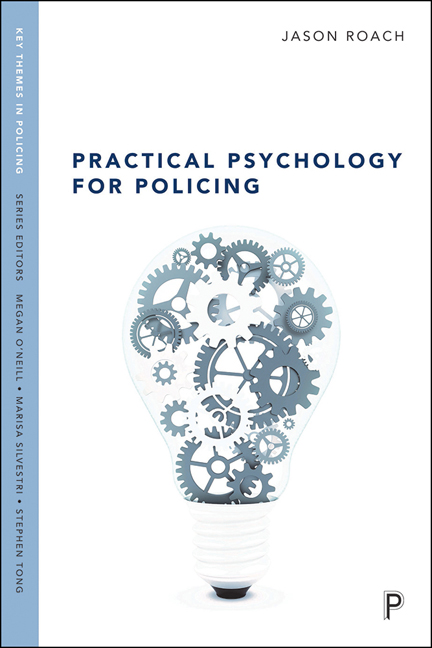Book contents
- Frontmatter
- Dedication
- Contents
- Series preface
- List of figures, tables, and boxes
- Acknowledgements
- 1 Introduction (or unleashing the kraken)
- 2 Psychology and policing: welcome bedfellows?
- 3 Human and police decision-making
- 4 Challenging common police perceptions of career criminals and serious offenders
- 5 Self-Selection Policing
- 6 Psychology, expertise, and improving police officer street-craft
- 7 Psychology and crime prevention
- 8 Psychology and police wellbeing
- 9 Psychology and policing: taking stock and where do we go from here?
- Notes
- References
- Index
4 - Challenging common police perceptions of career criminals and serious offenders
Published online by Cambridge University Press: 17 January 2024
- Frontmatter
- Dedication
- Contents
- Series preface
- List of figures, tables, and boxes
- Acknowledgements
- 1 Introduction (or unleashing the kraken)
- 2 Psychology and policing: welcome bedfellows?
- 3 Human and police decision-making
- 4 Challenging common police perceptions of career criminals and serious offenders
- 5 Self-Selection Policing
- 6 Psychology, expertise, and improving police officer street-craft
- 7 Psychology and crime prevention
- 8 Psychology and police wellbeing
- 9 Psychology and policing: taking stock and where do we go from here?
- Notes
- References
- Index
Summary
Introduction
This chapter is short deliberately. Its purpose is to challenge police thinking on criminal careers and career criminals (Roach and Pease, 2013). It exists to provide the theoretical and supporting research to influence police thinking towards the offence versatility of serious criminals. Its purpose is to unashamedly pave the way for the next which introduces the Self-Selection Policing (SSP) approach. For the reader to accept the psychology and research evidence behind the SSP approach, they must first be convinced that serious offenders tend to be more versatile than specialist with the crimes they commit. If you cannot be swayed towards this way of thinking (I once had a student who could not accept that serious criminals also commit less serious crimes) then it is probably advisable for you to skip Chapter 5 and move straight to Chapter 6.
In short, this chapter attempts to use psychological understanding and academic research to challenge current police perceptions of serious criminals as ‘crime specialists’; that is, the prevailing psychology of police officers that a serious criminal will only commit the same type of crime.
Understanding the crime and offending patterns of serious offenders is of obvious importance to both police psychology (that is, decision-making) and to police practice, particularly in the area of criminal investigation. The case will be made here, that for although current police thinking leans heavily towards a perception of serious criminals as ‘crime specialists’ (that is, they only stick to one type of crime and that is serious) most of the research evidence points in the opposite direction, towards serious criminals being ‘crime versatile’ (that is, they tend to commit a wider range of crimes including ‘minor’ ones).
The reader is forgiven for not accepting immediately why such a seemingly small change in police thinking, from viewing serious criminals as crime specialists to serious criminals as crime ‘versatilists’ (if this is indeed a word) as a big deal for police psychology, but a case will be made for why police need to switch their thinking by demonstrating how such a shift can open up additional investigative avenues with which to identify active, serious criminality.
As stated, the principal aim of this chapter is to pave the way ‘psychologically’ for the next, which introduces the SSP approach. SSP is an additional means by which active, serious offenders can be identified by the minor offences they commit.
- Type
- Chapter
- Information
- Practical Psychology for Policing , pp. 45 - 51Publisher: Bristol University PressPrint publication year: 2023

